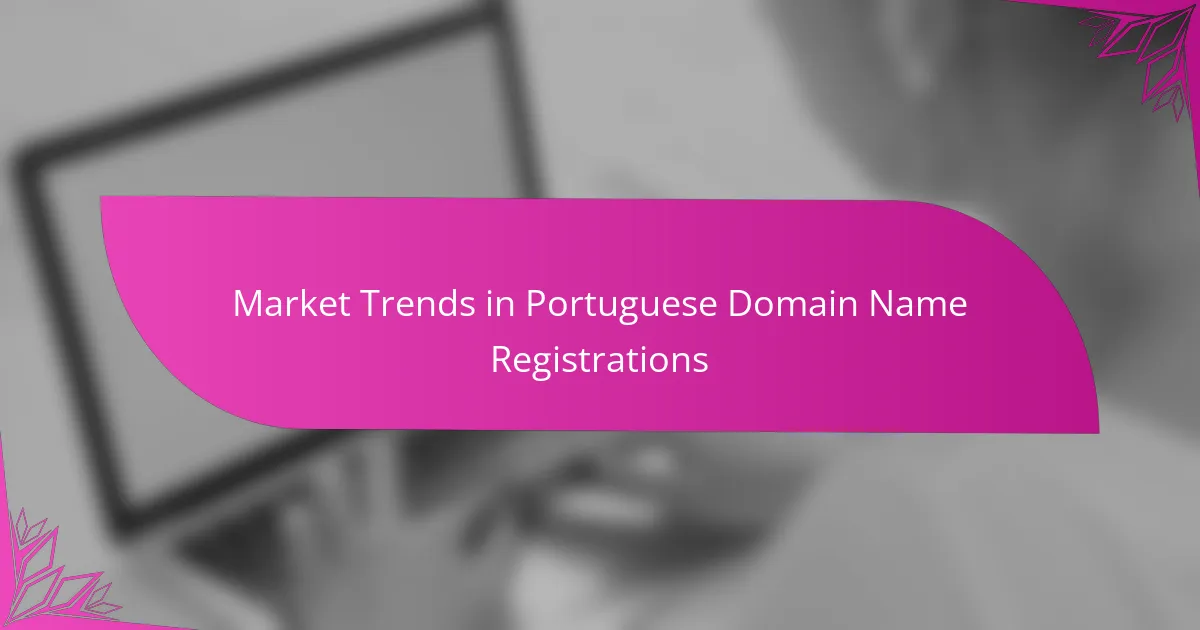Recent trends in Portuguese domain name registrations reveal a marked increase in .pt domains, driven by a surge in local businesses seeking to enhance their online visibility. This growth is notable not only within Portugal but also among Portuguese speakers worldwide, as interest in new generic top-level domains (gTLDs) rises. Factors such as local SEO practices and regulatory frameworks play a crucial role in shaping these market dynamics.
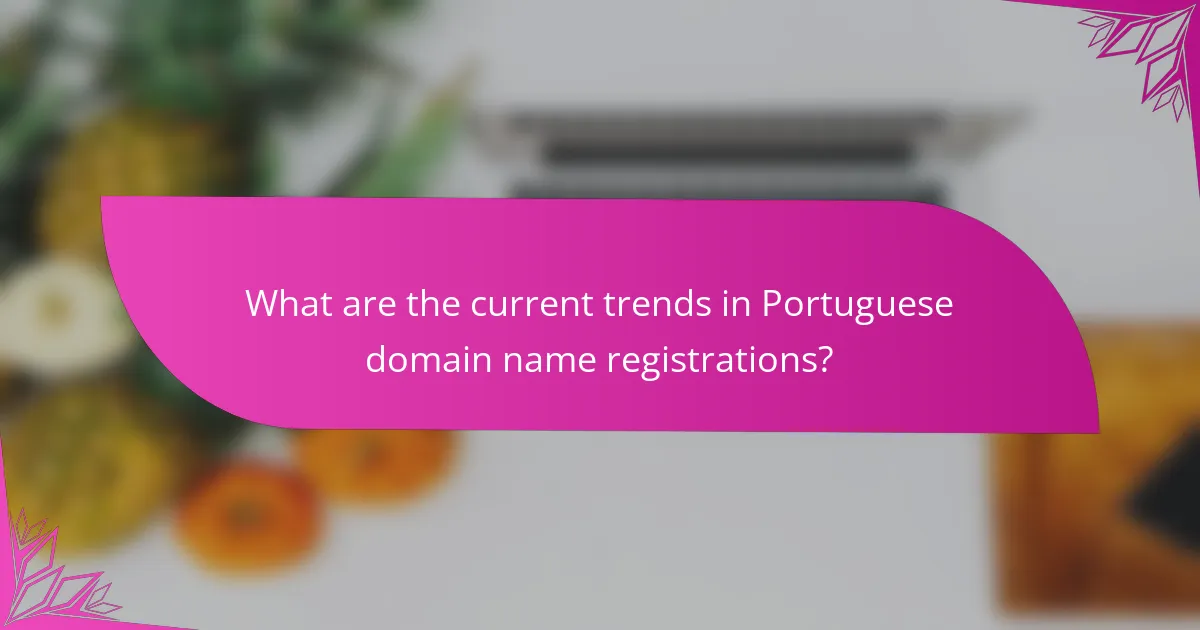
What are the current trends in Portuguese domain name registrations?
Current trends in Portuguese domain name registrations indicate a significant increase in .pt domains, alongside a growing interest in new generic top-level domains (gTLDs). Additionally, there is a rising focus on local businesses establishing their online presence through these registrations.
Increase in .pt registrations
The .pt domain has seen a notable surge in registrations, reflecting the growing digital landscape in Portugal. Businesses and individuals are increasingly recognizing the value of a local domain for brand identity and trustworthiness.
As of recent years, the number of .pt registrations has consistently increased, with estimates suggesting growth rates in the low double digits annually. This trend is driven by both new startups and established businesses transitioning to online platforms.
Growth of new gTLDs
New gTLDs are gaining traction among Portuguese registrants, offering more options for domain names that align with specific industries or interests. These domains, such as .online, .shop, and .tech, provide flexibility for businesses looking to differentiate themselves.
The appeal of new gTLDs lies in their availability and relevance, allowing companies to choose domains that better reflect their services. This trend is particularly beneficial for niche markets and innovative startups aiming to establish a unique online identity.
Rising interest in local businesses
There is a growing trend among Portuguese consumers to support local businesses, which is reflected in domain registration patterns. Many local entrepreneurs are opting for .pt domains to enhance their visibility and credibility in the market.
Local businesses that register a .pt domain can leverage this trend by emphasizing their connection to the community. This strategy not only fosters customer loyalty but also improves search engine rankings for local queries, making it a practical choice for businesses aiming to attract regional customers.
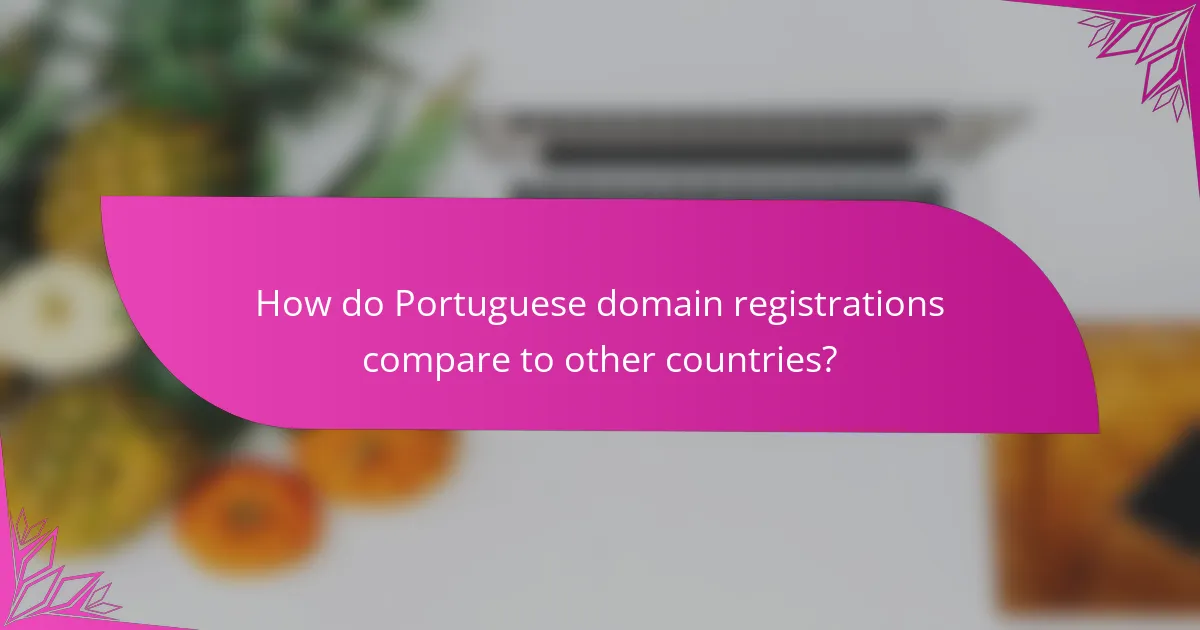
How do Portuguese domain registrations compare to other countries?
Portuguese domain registrations are experiencing notable growth, outpacing many other countries, particularly in Europe. This trend reflects a rising interest in establishing a digital presence within Portugal and among Portuguese speakers globally.
Higher growth rate than Brazil
Portugal’s domain registration growth rate has surpassed that of Brazil, driven by increasing online business activity and digital entrepreneurship. While Brazil remains a significant player in the domain market, Portugal’s smaller but more dynamic market is attracting attention.
Factors contributing to this growth include favorable regulations and a growing tech ecosystem in Portugal. As businesses and individuals seek to secure their online identities, the demand for .pt domains has surged, often resulting in registration rates that are higher than Brazil’s.
Competitive landscape in Europe
Within Europe, Portugal is becoming a competitive player in the domain registration market. The country benefits from a well-established infrastructure and a supportive regulatory environment, making it an attractive option for both local and international businesses.
Compared to larger European markets like Germany or the UK, Portugal offers a unique opportunity for niche businesses and startups. The relatively low cost of domain registration and the ease of navigating local regulations further enhance its appeal, positioning Portugal as a viable alternative for domain registrations in Europe.
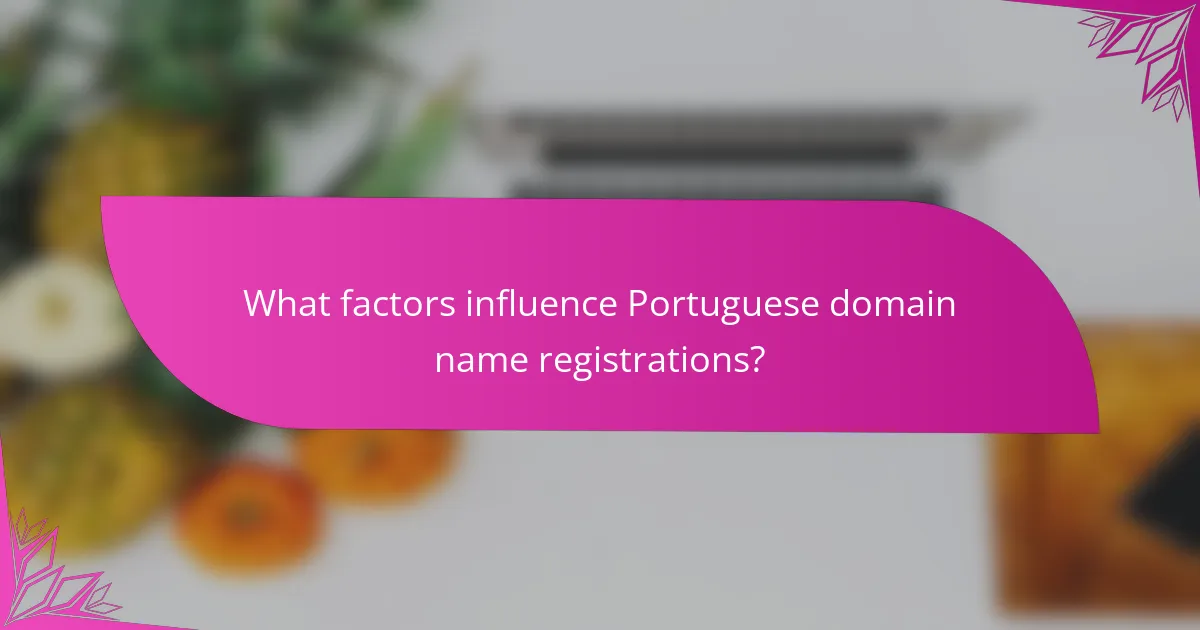
What factors influence Portuguese domain name registrations?
Several factors influence Portuguese domain name registrations, including local SEO practices, regulatory frameworks, and market trends. Understanding these elements can help businesses and individuals make informed decisions about their online presence in Portugal.
Local SEO importance
Local SEO plays a crucial role in Portuguese domain name registrations as it directly impacts visibility in search engine results. A domain name that includes relevant keywords or geographic indicators can enhance local search rankings, making it easier for potential customers to find businesses.
For example, a company based in Lisbon might benefit from a domain name that incorporates “Lisbon” or “PT” to signal its location. This strategy can lead to increased traffic and higher conversion rates, particularly for businesses targeting local clientele.
Regulatory impacts
Regulatory factors significantly affect domain name registrations in Portugal, particularly through the rules set by the national registry, DNS.PT. These regulations dictate eligibility requirements, registration processes, and domain management practices.
For instance, businesses must ensure compliance with local laws regarding domain ownership and usage. Additionally, understanding the registration fees, which can vary based on the domain extension, is essential for budgeting purposes. It’s advisable to stay updated on any changes in regulations to avoid potential pitfalls during the registration process.

What are the benefits of registering a .pt domain?
Registering a .pt domain offers significant advantages for businesses and individuals targeting the Portuguese market. It enhances local presence and credibility, making it easier for customers in Portugal to trust and engage with your brand.
Enhanced local credibility
A .pt domain signals to users that your business is rooted in Portugal, which can foster trust and reliability. This local association is particularly important for companies aiming to attract Portuguese customers, as they often prefer to engage with businesses that reflect their culture and language.
Additionally, having a .pt domain can distinguish your brand from international competitors. It shows commitment to the local market, which can lead to increased customer loyalty and a stronger brand reputation.
Better search engine rankings in Portugal
Using a .pt domain can improve your website’s visibility in search engine results within Portugal. Search engines often prioritize local domains when users search for services or products relevant to their location, giving you a competitive edge.
To maximize this benefit, ensure your website content is optimized for Portuguese language keywords and phrases. This combination of a local domain and localized content can significantly enhance your chances of ranking higher in search results, driving more traffic to your site.
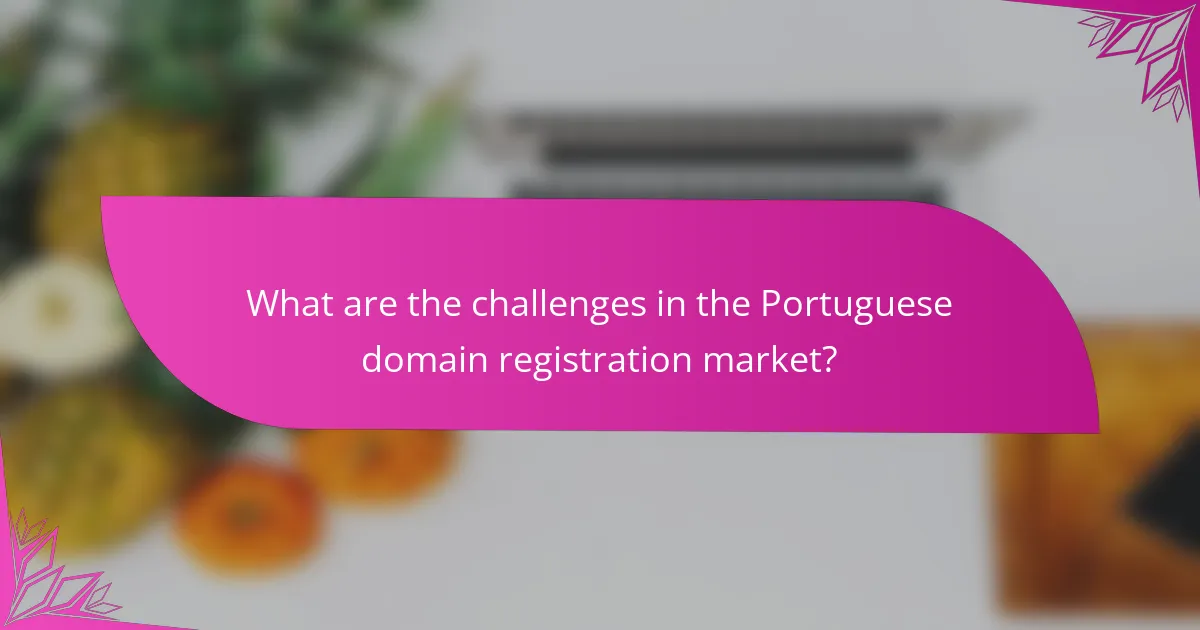
What are the challenges in the Portuguese domain registration market?
The Portuguese domain registration market faces several challenges that can complicate the process for businesses and individuals. Key issues include domain name availability and regulatory compliance requirements, both of which can hinder timely registrations and increase costs.
Domain name availability issues
One of the primary challenges in the Portuguese domain registration market is the availability of desired domain names. Many popular names are already taken, leading to a competitive environment where businesses must be creative in their choices. This often results in longer and more complex domain names, which can affect branding and online visibility.
To navigate availability issues, consider using variations or alternative extensions such as .pt, .com.pt, or even newer domain extensions. Utilizing domain name generators can also help identify unique options that still align with your brand identity.
Regulatory compliance requirements
Regulatory compliance is another significant challenge in the Portuguese domain registration market. Registrants must adhere to specific rules set by the national registry, including providing accurate contact information and ensuring that the domain name does not infringe on existing trademarks. Failure to comply can result in the loss of the domain.
It’s essential to familiarize yourself with the regulations governing domain registrations in Portugal. Keeping documentation organized and ensuring that all information is up to date can help avoid potential pitfalls. Consulting with a legal expert on intellectual property can also provide valuable guidance in navigating these requirements.

How to choose the right domain name in Portugal?
Choosing the right domain name in Portugal involves selecting a name that reflects your business identity while being easy to remember and relevant to your target audience. Consider factors such as local language, cultural nuances, and the availability of the desired domain extension, particularly .pt for Portuguese businesses.
Relevance to business niche
Your domain name should clearly convey the nature of your business or the services you offer. A relevant domain helps potential customers understand what you do at a glance, which can enhance your online visibility and search engine ranking.
For example, if you run a bakery, a domain like “LisbonBakery.pt” immediately informs visitors about your location and business type. Avoid generic names that do not specify your niche, as they can dilute your brand’s message and make it harder for customers to find you.
Brandability and memorability
A brandable domain name is unique, catchy, and easy to remember. It should resonate with your target audience and reflect your brand’s personality. Shorter names are often more memorable, so aim for a concise and impactful choice.
Consider using creative word combinations or made-up words that are easy to spell and pronounce. For instance, “BoloDelicia.pt” combines the Portuguese word for cake with a term that suggests delight, making it both brandable and memorable. Avoid complex spellings or hyphens, as these can confuse potential visitors.
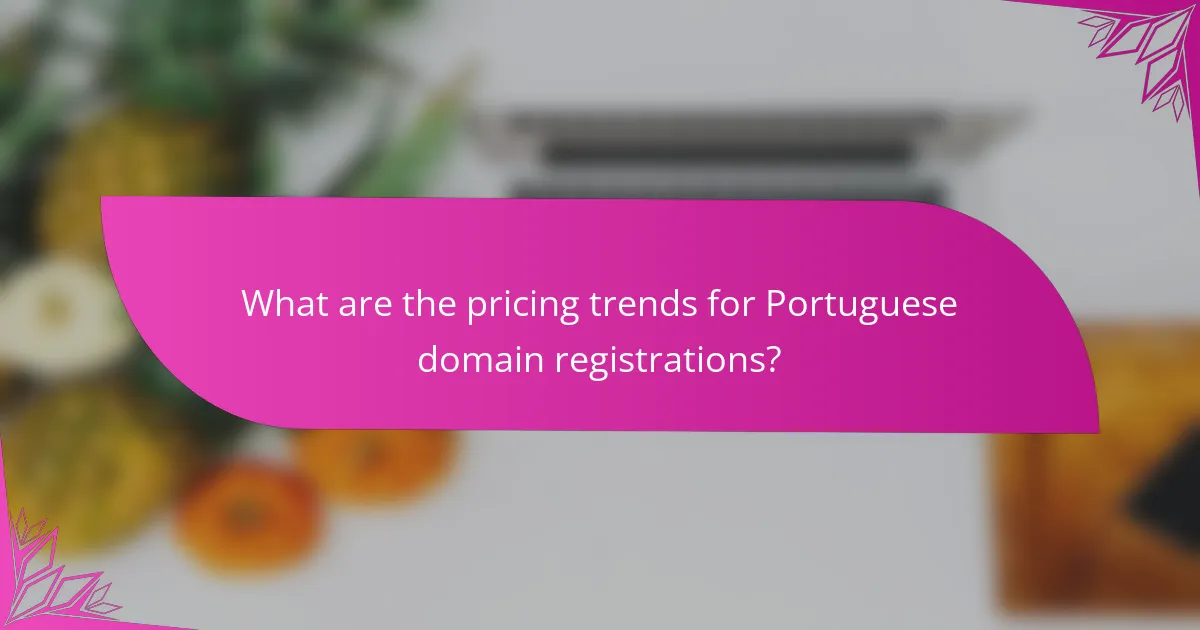
What are the pricing trends for Portuguese domain registrations?
Pricing trends for Portuguese domain registrations, particularly for .pt domains, have shown a gradual increase over recent years. Factors influencing these trends include market demand, competition among registrars, and changes in regulatory policies.
Average costs for .pt domains
The average cost for registering a .pt domain typically ranges from €10 to €30 per year. Prices can vary based on the registrar and any additional services offered, such as privacy protection or web hosting. It’s advisable to compare different registrars to find the best deal.
Some registrars may offer promotional rates for the first year, which can lower the initial cost. However, be aware that renewal rates may be higher, so check the long-term pricing structure before committing.
Price comparison with other TLDs
When comparing .pt domains to other top-level domains (TLDs), such as .com or .net, .pt domains often fall within a similar price range but can be slightly higher due to local demand. For instance, .com domains typically cost between €10 and €20 annually, making them a more affordable option for some users.
However, the choice of TLD should also consider branding and target audience. A .pt domain may enhance local credibility for businesses operating in Portugal, despite potentially higher costs compared to generic TLDs.

What is the future outlook for Portuguese domain registrations?
The future of Portuguese domain registrations appears promising, driven by increasing digitalization and a growing emphasis on local branding. As businesses and individuals recognize the importance of online presence, demand for .pt domains is expected to rise, reflecting broader trends in e-commerce and digital marketing.
Emerging trends in digital branding
Digital branding is evolving rapidly, with a focus on authenticity and local relevance. Companies are increasingly opting for domain names that resonate with their target audience, particularly in the Portuguese market, where cultural nuances play a significant role in consumer engagement.
One notable trend is the rise of short, memorable domain names that enhance brand recall. Businesses are encouraged to choose names that are easy to spell and pronounce, which can significantly improve online visibility and customer retention. For instance, brands like “Sapo.pt” have successfully leveraged their domain names to establish a strong online identity.
Additionally, the use of local keywords in domain names is gaining traction. This strategy not only aids in search engine optimization but also fosters a sense of community and trust among Portuguese consumers. Companies should consider incorporating relevant terms that reflect their services or products while maintaining a connection to local culture.
